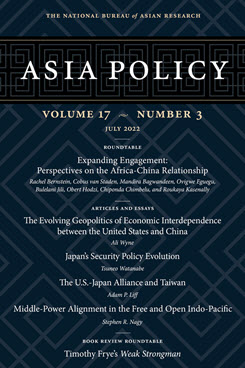Expanding Engagement: Perspectives on the Africa-China Relationship
The essays in this roundtable provide both regional and functional case studies examining different facets of the China-Africa relationship from the perspective of African states, ranging from medical diplomacy and infrastructure development to smart cities in Kenya and the Digital Silk Road to local responses to China’s growing influence and image campaigns in Zambia and Mauritius.
Introduction
Rachel Bernstein
Chinese Vaccine Diplomacy in Africa
Cobus van Staden
Changing Realities: China-Africa Infrastructure Development
Mandira Bagwandeen
The Digital Silk Road: Connecting Africa with New Norms of Digital Development
Ovigwe Eguegu
Chinese ICT and Smart City Initiatives in Kenya
Bulelani Jili
The China Effect: Democracy and Development in the 21st Century
Obert Hodzi
Status Complicated: In Zambia, China-Africa Is a Partnership Washington Should Not Necessarily Envy
Chiponda Chimbelu
China in Mauritius: The Telling of the Chinese Story
Roukaya Kasenally
Introduction
Over the last decade, China’s presence on the global stage has shifted dramatically: the country is now an economic powerhouse and increasingly influential in international organizations. As China rises, questions also arise pertaining to its strategic objectives toward many regions and in many domains. China appears to be seeking a “loose, partial, and malleable” hegemony over the global South—making the African continent a strategic priority for Beijing.[1]
This Asia Policy roundtable is a result of a current research initiative at the National Bureau of Asian Research, “Into Africa: China’s Emerging Strategy,” which aims to better understand China’s strategic ambitions in Africa and assess how the continent fits into China’s envisioned global order. The first three reports in this project to date have examined China’s expansion into Africa from Beijing’s perspective, often relying on Chinese-language sources to draw conclusions and analyze China’s strategy.[2] Yet, only looking at Beijing’s viewpoint to get a fuller grasp on China-Africa relations would be a gross oversight that would provide an incomplete impression of China’s engagement with the continent.
Africa is a continent with 54 countries and a population of more than 1.3 billion people. China’s engagement with the continent, of course, does not have the same level of impact or influence in all these countries, and not all states share the same opinion regarding China’s presence. This roundtable seeks to share, highlight, and examine African perspectives regarding China’s engagement with and influence on the continent. The essays here provide both regional and functional case studies examining different facets of the China-Africa relationship from the perspective of African states, ranging from medical diplomacy and infrastructure development to smart cities in Kenya and the Digital Silk Road to local responses to China’s growing influence and image campaigns in Zambia and Mauritius.
Cobus van Staden evaluates China’s medical diplomacy as the Covid-19 pandemic becomes endemic. While China’s mask diplomacy in the early phases of the pandemic was effective and garnered positive responses, its later vaccine diplomacy suffered setbacks. Although Beijing appeared to overpromise and underdeliver, he concludes that vaccine and medical diplomacy can be considered a diplomatic victory for China, compared to the West’s disappointing and underwhelming response.
Looking at another area of diplomacy and outreach, Mandira Bagwandeen discusses China’s infrastructure investments and application of the Belt and Road Initiative (BRI) in African countries as well as key outcomes from the Eighth Forum on China-Africa Cooperation (FOCAC) in November 2021. Amid accusations of debt-trap diplomacy and the financial pressures of the Covid-19 pandemic, she finds that China has demonstrated some willingness to negotiate debt-relief measures with African states. Discussions at FOCAC, however, indicated that China intends to begin re-directing its development assistance away from financing infrastructure development through large loans and toward trade facilitation.
Also under the BRI umbrella is the Digital Silk Road, which is focused on improving states’ infrastructure for information and communications technology and digital capabilities. As Ovigwe Eguegu explains, the Digital Silk Road is attractive to many African governments, including Ethiopia, Senegal, Gambia, and Zimbabwe, due to China’s emphasis on digital sovereignty, which aligns with their development priorities. However, obstacles, such as a lack of digital infrastructure, still must be overcome before the Digital Silk Road becomes fully popularized in Africa.
Bulelani Jili also addresses technology development in Africa, focusing particularly on smart cities in Kenya as a case study. He argues that China’s “no strings attached” lending practices, especially for technology development, create opportunities for technology to be abused in societies where few data and privacy regulations exist. Jili asserts that it is not necessarily the sharing of the technologies that is worrisome, but the local governance conditions that can enable unjust surveillance practices in smart cities and using smart technologies.
Obert Hodzi examines the effect of China’s rise and presence in Africa on democracy and development, looking specifically at Zimbabwe, Rwanda, and Ethiopia. He argues that while China does not promote its authoritarian model, by highlighting alternatives to democracy that underscore weaknesses in democratic societies, it provides countries with an alternative governance model to consider. Moreover, China’s indifference to regime type in its aid and lending policies enables authoritarian actors in Rwanda, Zimbabwe, and Ethiopia to use their relationship with Beijing to secure regime survival.
Using Zambia as a case study, Chiponda Chimbelu shows that reactions toward Chinese engagement and aid have been mixed. Many Zambians recognize the economic benefit Zambia has derived from engagement with China but remain skeptical of the investment and jobs created by Chinese companies and are critical of Zambia’s debt to Beijing.
Lastly, Roukaya Kasenally looks at China’s relationship with one specific country: Mauritius. She overviews Mauritius’s unique context, including the history of China’s relationship with Mauritius, and discusses China’s investment in the Mauritian media and information environment as a means to influence the narrative surrounding China. Kasenally shows that China continues to invest heavily in Mauritian media to “tell China’s story well” at the same time that Western media is beginning to withdraw and decrease its presence in the country.
While the roundtable highlights diverse—and at times contrasting—opinions on China’s role and presence in Africa, a common thread exists: China offers an attractive alternative in governance, investment, aid, and development to the United States and the West more generally. Even though China is not always the preferred country for engagement, the West’s lack of engagement and failure to focus on African-centered development has left some countries with few realistic or viable alternatives.
Rachel Bernstein
The National Bureau of Asian Research
Rachel Bernstein is a Project Manager with the Political and Security Affairs group at the National Bureau of Asian Research (United States).
Cobus van Staden is the Managing Editor of the China Global South Project (South Africa), a multiplatform media startup tracking China’s engagement with the global South with a comparative focus on Africa. He is also a Research Affiliate at the South African Institute of International Affairs in the Foreign Policy Programme and a Visiting Lecturer in Media Studies at the University of the Witwatersrand.
Mandira Bagwandeen is a Senior Research Fellow at the Nelson Mandela School of Public Governance at the University of Cape Town (South Africa).
Ovigwe Eguegu (Nigeria) is a Policy Analyst at Development Reimagined, where he specializes in geopolitics with particular reference to Africa in a changing global order. His work includes research, consulting, and providing strategic advice to public- and private-sector actors.
Bulelani Jili is a PhD candidate at Harvard University, where he is a Meta Research PhD Fellow (United States). His research interests include information and communications technology development, Africa-China relations, cybersecurity, and privacy law. He is also a Visiting Fellow at Yale Law School, a Cybersecurity Fellow at the Harvard Kennedy School, a Fellow at the Atlantic Council, Scholar-in-Residence at the Electronic Privacy Information Center, and a Research Associate at Oxford University.
Obert Hodzi is a Lecturer in the Department of Politics at the University of Liverpool (United Kingdom). His research focuses on international politics, conflict and security, and non-Western emerging powers in global governance. He has empirical expertise on China and Africa.
Chiponda Chimbelu is a Zambian-American journalist based in Berlin, Germany. He works mostly as a news producer and editor with Deutsche Welle, Germany’s international broadcaster.
Roukaya Kasenally is a democracy scholar and an Associate Professor at the University of Mauritius (Mauritius).
Endnotes
[1] Nadège Rolland, “China’s Vision for a New World Order,” National Bureau of Asian Research
(NBR), NBR Special Report, no. 83, January 2020, 6.
[2] Nadège Rolland, “A New Great Game? Situating Africa in China’s Strategic Thinking,” NBR,
NBR Special Report, no. 91, June 2021, https://www.nbr.org/publication/a-new-great-gamesituating-africa-in-chinas-strategic-thinking/; Nadège Rolland, ed., “(In)Roads and Outposts: Critical Infrastructure in China’s Africa Strategy,” NBR, NBR Special Report, no. 98, May 2022, https://www.nbr.org/publication/inroads-and-outposts-critical-infrastructure-in-chinasafrica-strategy; and Nadège Rolland, ed., “Political Front Lines: China’s Pursuit of Influence in Africa,” NBR, NBR Special Report, no. 100, June 2022, https://www.nbr.org/publication/political-front-lines-chinas-pursuit-of-influence-in-africa.
About Asia Policy
Asia Policy is a peer-reviewed scholarly journal presenting policy-relevant academic research on the Asia-Pacific that draws clear and concise conclusions useful to today’s policymakers. Asia Policy is published quarterly in January, April, July, and October and accepts submissions on a rolling basis. Learn more



 Into Africa: China's Emerging Strategy
Into Africa: China's Emerging Strategy
